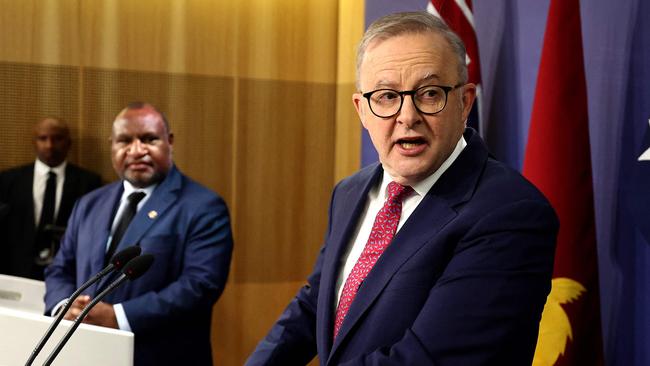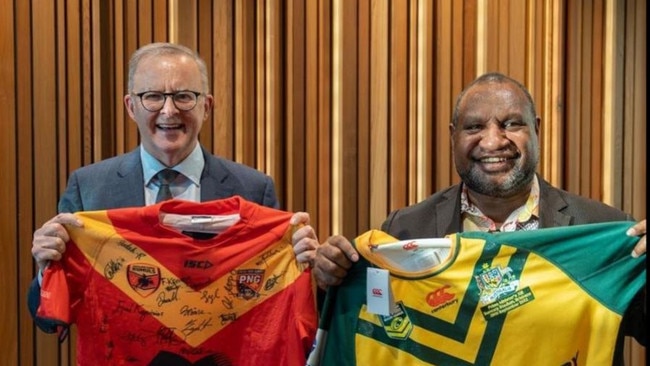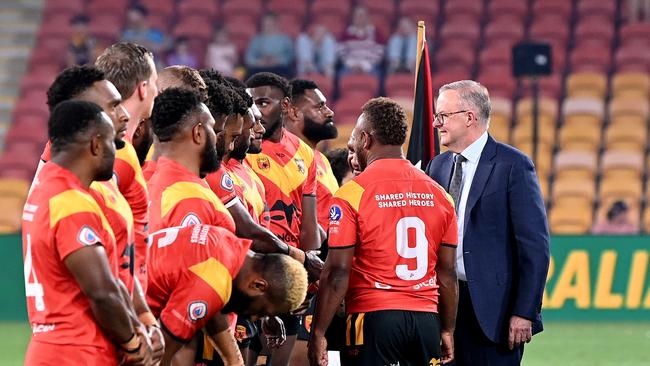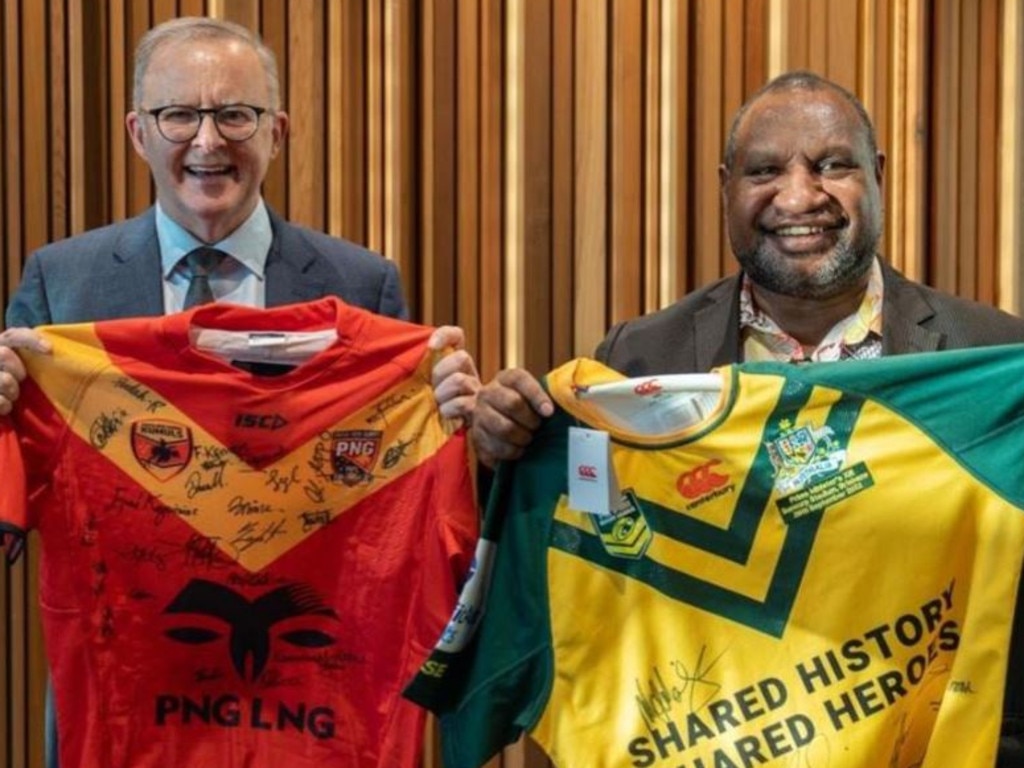China benched as Papua New Guinea and Australia seal the deal for new NRL team
A historic $600m deal to establish a PNG NRL team has dashed China’s hopes for a security pact with Australia’s nearest neighbour for at least a decade.

A historic $600m deal to give Papua New Guinea an NRL team has dashed China’s hopes for a security pact with Australia’s nearest neighbour under a provision allowing the agreement to be terminated if PNG undermines the nations’ “strategic trust”.
Anthony Albanese and his PNG counterpart James Marape formally unveiled the taxpayer-funded deal on Thursday, in which a Port Moresby-based side will take to the field in 2028.
“Rugby league is PNG’s national sport and PNG deserves a national team,” Prime Minister Albanese said. “The new team will belong to the people of PNG and it will call Port Moresby home. It will have millions of people barracking for it from day one.”
Mr Marape said the agreement was about more than just sport, bringing his country together and cementing its deep ties with Australia.
“This is more than a game – it is a symbol of unity and mutual respect,” he said.
“Sport has the unique power to unite our two peoples, who share an ancient history and even the same DNA, as seen in the bond between Papua New Guineans and Torres Strait Islanders.”
The 10-year deal includes $290m for the new franchise, $250m for rugby league development in the Pacific, and $60m for NRL licensing fees.
PNG has committed $150m to help get the team off the ground, pledging to build a secure accommodation and provide salary tax exemptions to attract top-flight international talent.
Mr Marape vowed to ensure the safety of players and officials in Port Moresby, which has a reputation of being the region’s most dangerous city, declaring: “I bet my life on this.”
A senior government source said a confidential bilateral agreement sat alongside the countries’ deal with the NRL, making it clear the arrangement was underpinned by “shared strategic trust”.
There is no explicit right of veto in the agreement over PNG’s future security partnerships, such as those in recent pacts with Nauru and Tuvalu. But it allows Australia to axe funding for the franchise at any point, the source said, in a powerful disincentive to PNG opening the door to closer security ties with Beijing for at least the next decade.
“This is about diplomacy; this is about making Australia safer; this is about securing our status as the security partner of choice in the Pacific,” the source said.

The agreement follows efforts by China this year to seal a bilateral policing agreement with Port Moresby, in the hope of securing a security foothold in the country along the lines of its controversial pact with Solomon Islands.
While the PNG franchise will not enter the competition for another three years, the funding deal is capped at 10 years, so the team is only guaranteed until 2034.
But Mr Marape said his entire nation would get behind the side to make it a success. PNG wasn’t “just filling the numbers”, he said, declaring: “We want to win the competition.”
Mr Marape said the online viewing audience for the side’s games would be “enormous”, and there were 100,000 Papua New Guineans living in Australia who would provide a ready-made pool of spectators for away matches.
Underscoring the strategic element of the deal, a formal bilateral security agreement signed by the leaders 12 months ago officially began on Thursday. The agreement says the nations will prioritise their bilateral security relationship and consult each other on strategic threats.
Mr Albanese said: “This isn’t just about what happens during the 80 minutes of play on the field of the NRL. This is about an entire relationship of lifting up Papua New Guinea. It’s about economic development and that includes of course security relationships.
“We do live in a region where there is strategic competition. That is well known.”
Mr Marape said his country had taken a deliberate decision to make Australia its “security partner of choice”.
“That doesn’t stop us from relating with any nation, especially our Asian neighbours. We relate with China, for instance, a great trading partner, a great bilateral partner. But in security, closer to home, we have the synergy and our shared territory needs to be protected, defended, policed.”
Australian Rugby League chairman Peter V’landys said the deal was a historic step forward for the game. “Rugby league is the number one sport in the Pacific. This new club will solidify rugby league’s role as the unifying language of our region.
“Roughly half the funding in this historic agreement with the federal government will go to grassroots football and community programs in PNG. It will also flow across the Pacific, including to Fiji, Tonga and Samoa.”
The deal caps off a run of diplomatic coups by the Albanese government in the Pacific, including last week’s deal with Nauru that requires Australia to consent to any future security agreements the country wants to sign in return for $140m in development support and a guarantee of ongoing banking services to the country.
Mr Albanese also secured a region-wide policing partnership with Pacific countries in August that will set up a regional police response group and boost training for Pacific police force members in Brisbane and three other centres.
More Coverage






To join the conversation, please log in. Don't have an account? Register
Join the conversation, you are commenting as Logout